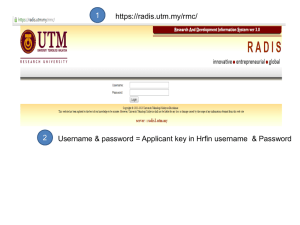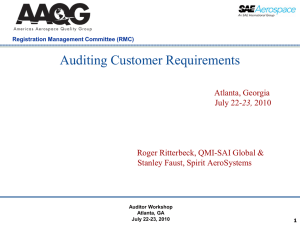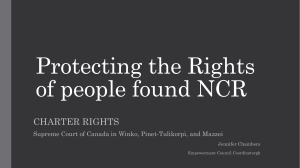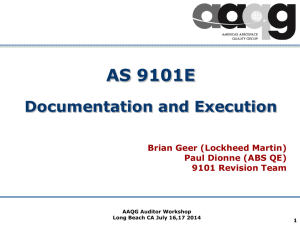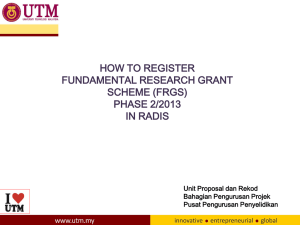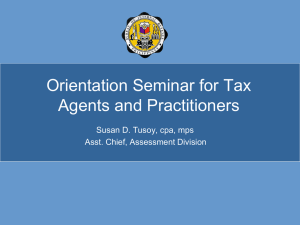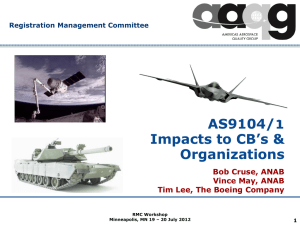Improvement Opportunities for Audit Reporting
advertisement
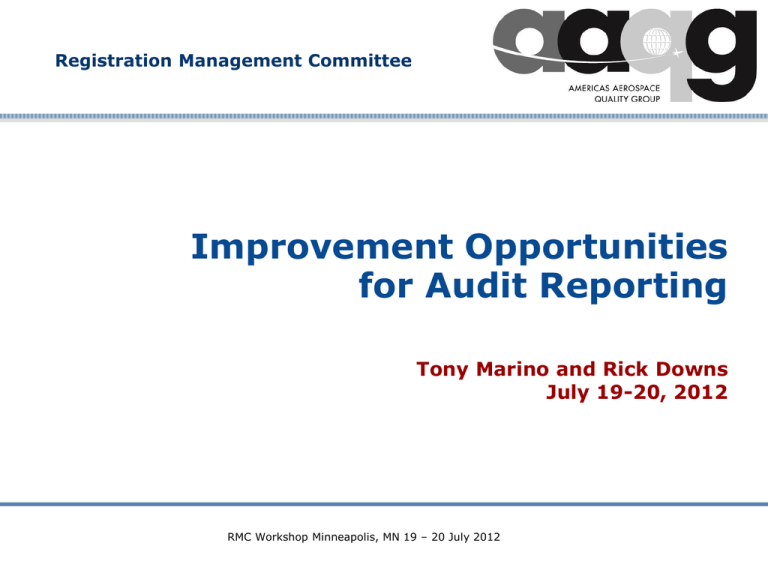
Registration Management Committee Improvement Opportunities for Audit Reporting Tony Marino and Rick Downs July 19-20, 2012 RMC Workshop Minneapolis, MN 19 – 20 July 2012 Company Confidential Registration Management Committee Workshop Approach: • Review form instructions • Break up into teams and review report • Each team will present its critique of the report reviewed • As a group we will reach a consensus on what improvements are needed • We will review a QMS Matrix, NCR and PEAR RMC Workshop Minneapolis, MN 19 – 20 July 2012 Registration Management Committee QMS Process Matrix Report: • For each site audited, the QMS Process Matrix shall be completed to identify which processes and quality management system clauses have been audited. • NOTE 1: This form can also be used to document the audit program for a full certification cycle and the audit plans for each audit (e.g., stage 2, surveillance, recertification). • NOTE 2: The standard is structured as indicated in the left hand vertical column; the organization identifies their processes and provides the listing to the audit team leader. These processes shall be listed at the top of the form. The audit team with the organization’s assistance identifies the interrelationships between the standard’s clauses and organization’s processes (e.g., organization has a design process and clause 7.3 is associated to this process). In some cases, the organization’s process may have the same name as the clause of the standard (e.g., Purchasing). RMC Workshop Minneapolis, MN 19 – 20 July 2012 Registration Management Committee QMS Process Matrix Report: Identify the organization’s processes, subprocesses, and value added activities, as defined by the • 8 audited organization. Identify the name of the associated area(s) involved, if appropriate. • NOTE 1: For a site, it is possible that not all organization processes are applicable and/or performed at this location. In this situation, list the applicable processes or activities within a specific process performed at this site/location. • Examples of processes/sub-processes/value added activities: – Product Realization: » » » » » » » Manufacturing – Machining Manufacturing – Painting Manufacturing – Assembly Purchasing Design o Design/Avionics Dept. o Design/Door Actuators Dept. • NOTE 2: If there are more processes than columns, additional forms can be used. RMC Workshop Minneapolis, MN 19 – 20 July 2012 Registration Management Committee QMS Process Matrix Report: • 9 Identify in box 8. the PEAR ID as completed for the process indicated • NOTE: At a minimum, for each audited product realization process a PEAR must be completed. • 10 For each process, indicate the applicable 9100/9110/9120 clause(s) as follows: – Record a ”C” to denote a clause found Conforming. – Record a ”N” to denote a clause found Nonconforming. • NOTE: For clauses not applicable or not evaluated the appropriate box remains empty. RMC Workshop Minneapolis, MN 19 – 20 July 2012 Registration Management Committee QMS Process Matrix Report: • In your teams review the QMS Process Matrix Report provided. Come to a consensus and record any concerns and recommended improvements on your flip chart. • If consensus cannot be reached record the differing thoughts on your flip chart. • Select a team spokesperson. • You have 10 minutes. RMC Workshop Minneapolis, MN 19 – 20 July 2012 Registration Management Committee Nonconformity Report (NCR): • 7 The NCR has four sections; each section shall be completed in order, at the various stages of the NCR: – Section 1 – documented by the auditor when recording the nonconformity. – Section 2 – documented by the auditee after the containment action, root cause analysis determination, and corrective action plans are defined; and the implementation of the corrective action by the auditee has occurred. – Section 3 – documented by the auditor after verification of the implementation and effectiveness of the corrective action by the auditor. – Section 4 – documented by the auditor and audit team leader after final acceptance/closure of the NCR. • NOTE: The audit team leader and auditee can agree on multiple stages for status reporting of the NCR for Section 2 (e.g., after correction, after planning the corrective action, after completion of the corrective action). RMC Workshop Minneapolis, MN 19 – 20 July 2012 Registration Management Committee Nonconformity Report (NCR): • 9 Identify the primary 9100/9110/9120 clause(s) and/or customer requirement to which the nonconformity was written. • 10 Determine the nonconformity classification (i.e., major, minor) according to the definitions provided in this standard (see clauses 3.2 and 3.3 of this standard). When the nature of the nonconformity needs immediate containment action, the auditee shall describe the immediate actions (‘fix now’) taken to contain the nonconforming situation/conditions and to control any identified nonconforming products. Correction shall always be recorded. • NOTE: Any immediate containment action and correction can be reviewed by the audit team during the audit. RMC Workshop Minneapolis, MN 19 – 20 July 2012 Registration Management Committee Nonconformity Report (NCR): • 19 Provide a detailed description of the root cause(s) of the nonconformity; that is describe how/why the nonconformity occurred. • NOTE: In most cases, documenting ‘isolated case’ or ‘lack of instruction’ are not appropriate ‘root causes’ as there are system causes in other domains (e.g., insufficient supporting or management processes). • 21 Describe the action(s) to be taken to prevent the recurrence of the nonconformity. RMC Workshop Minneapolis, MN 19 – 20 July 2012 Registration Management Committee Nonconformity Report (NCR): • In your teams review the NCR provided. Come to a consensus and record any concerns and recommended improvements on your flip chart. • If consensus cannot be reached record the differing thoughts on your flip chart. • Select a team spokesperson. • You have 15 minutes. RMC Workshop Minneapolis, MN 19 – 20 July 2012 Registration Management Committee Process Effectiveness Assessment Report (PEAR) • 8 Identify the process assessed; indicate the name of the process, as defined by the organization. • 9 Summarize the process activities, inputs, and outputs; including the identification of associated process interfaces. • 10 Identify the applicable primary 9100/9110/9120 clause(s) for this process. • 11 Describe the method used by the organization to determine process effectiveness [e.g., identification of Key Performance Indicators (KPIs) and associated targets, process capability data]. RMC Workshop Minneapolis, MN 19 – 20 July 2012 Registration Management Committee Process Effectiveness Assessment Report (PEAR) • 12 Annotate relevant objective evidence, observed conditions, data, information, comments, etc. to support the auditor's statement of effectiveness or ineffectiveness, as indicated in Box #13. • 13 Indicate to what extent the audited process was determined effective. • Effectiveness: extent to which planned activities are realized and planned results achieved (reference ISO 9000). – NOTE 1: A major (ma) NCR shall be issued when the effectiveness level of the process is rated a "1". – NOTE 2: A major (ma) or minor (mi) NCR shall be issued when the effectiveness level of the process is rated a "2" (see nonconformity definitions in clause 3). RMC Workshop Minneapolis, MN 19 – 20 July 2012 Registration Management Committee Process Effectiveness Assessment Report (PEAR) • In your teams review the PEAR provided. Come to a consensus and record any concerns and recommended improvements on your flip chart. • If consensus cannot be reached record the differing thoughts on your flip chart. • Select a team spokesperson. • You have 15 minutes. RMC Workshop Minneapolis, MN 19 – 20 July 2012 Registration Management Committee Wrap Up • Effective completion of new 9101 forms relies on: – Effective communication – Be brief and succinct – Instruction sheets are there to help – We are dealing with both compliance and performance » Effectiveness is not subjective, a process is either implemented (compliant) or not and either targets are met or not – Corrective Actions must address all root causes identified RMC Workshop Minneapolis, MN 19 – 20 July 2012 Registration Management Committee Questions RMC Workshop Minneapolis, MN 19 – 20 July 2012
